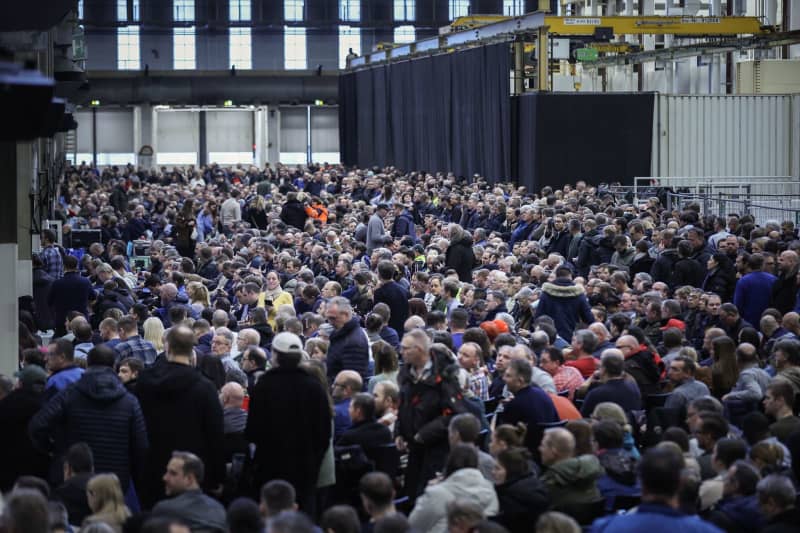Workers at Volkswagen, Europe’s largest car manufacturer, are escalating their strike actions as they initiate rolling strikes at nine plants across Germany, coming only a week after their first wave of industrial action. This renewed strike action coincides with the fourth round of negotiations between management and labor representatives regarding significant issues such as proposed pay cuts and potential factory closures. The IG Metall union, which represents a majority of Volkswagen’s workforce, stands firmly against the company’s proposal for a 10% salary reduction aimed at maintaining competitiveness within the automotive industry. Instead, IG Metall is advocating for the retention of all ten plants in Germany and the protection of jobs for the approximately 130,000 workers employed under the core Volkswagen brand.
The upcoming strikes will commence at the Wolfsburg plant, Volkswagen’s headquarters, with the union stipulating that each strike will last four hours as opposed to the two-hour duration observed during the initial strikes last week. This show of solidarity and strength from the workforce reflects their growing discontent with management’s approach to handling the financial challenges faced by the company. The broader impact of the rolling strikes is intended to signal to management the seriousness of the situation, particularly as the negotiations open a critical dialogue about job security and working conditions. The strikes will also affect other key plants in Zwickau, Hanover, Emden, Kassel-Baunatal, Braunschweig, Salzgitter, Chemnitz, and Dresden, while only the Osnabrück plant stands outside the current collective bargaining agreement.
While the first wave of strikes resulted in an impressive mobilization of around 100,000 workers across the assembly lines, Volkswagen management reported that production losses were limited in scope, prompting a mixed response from the corporate side to the ongoing labor unrest. Despite the relatively minor impact reported, the significance of the strikes goes beyond immediate production figures; they encapsulate broader concerns over job security, pay equity, and the future strategic direction of the company amidst a rapidly changing automotive landscape. By asserting their collective bargaining power, workers aim to sway management to reconsider its stance on essential worker conditions in the wake of industry-wide shifts towards electric vehicles and increased globalization.
Negotiations are set to take place at the Volkswagen Arena, adding a symbolic dimension to the discussions as key stakeholders gather to address the critical issues at hand. The union’s negotiation teams are likely to press for a framework that would ensure job guarantees and prevent uncertainty related to factory closures. The union argues that the company must prioritize its workforce as it navigates financial challenges, emphasizing a shared responsibility in ensuring long-term competitiveness without sacrificing the well-being of employees. The atmosphere surrounding these negotiations is expected to be charged, given the recent industrial actions and the firm stance taken by both sides.
As the automotive sector grapples with transformations driven by technological advancements and an increasing push toward sustainability, Volkswagen’s situation is emblematic of larger trends affecting manufacturers globally. Unions like IG Metall are playing a crucial role in advocating for workers amidst these shifts, calling for accountability from management to prioritize employee interests along with corporate profitability. The outcomes of these negotiations could set important precedents not just for Volkswagen but also for labor relations across the automotive industry in Europe as a whole.
In conclusion, the stakes are high as Volkswagen’s workforce takes a firm stand against proposed pay cuts and potential factory closures. The rolling strikes at multiple plants signify a pivotal moment for both the company and its employees, translating worker solidarity into action and reinforcing the need for extensive discussions around job security and competitive practices. As negotiations progress, both management and labor representatives must seek common ground to secure a sustainable future for Volkswagen, its employees, and the broader automotive sector facing unprecedented changes. The results of these labor movements could very well shape the future landscape of labor relations in the industry, highlighting the delicate balance between maintaining competitiveness and ensuring the welfare of workers.

